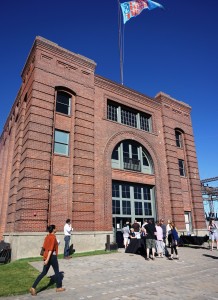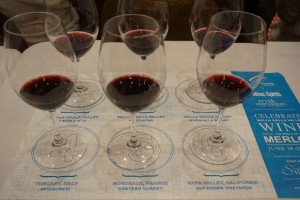Merlot’s flavor profile a matter of preference

The historic Power House Theatre in Walla Walla played host to Master Sommelier, Fred Dame, and editor-in-chief of Vinous, Stephen Tanzer, at last weeks’ Celebrate Walla Walla Valley Wine. Viki Eierdam
Attendees of last weeks’ Celebrate Walla Walla Valley Wine were treated to a thought-provoking presentation on merlot-growing in Walla Walla at the Power House Theatre—an historic power station that dates back to 1890.
Keynote speakers, Fred Dame and Stephen Tanzer, deftly presided over the exquisite 342-seat venue, drew laughs in all the right places and possibly even struck a bit of fear in a packed house that had come to hear why merlot in Walla Walla has a bright future only to find out that not everyone is sold on that idea.

If you’re wine critic, Stephen Tanzer, Walla Walla’s climate could be too warm for a traditional Bordeaux style.
The world looks to the right bank of France (I.e. Saint-Émilion and Pomerol) as the gauge by which all other merlot is measured and, if you’re Tanzer, Walla Walla’s climate could be too warm for a traditional Bordeaux style.
That is not to say that noteworthy merlot cannot be grown this far east—as evidenced by the awards prominently displayed in tasting rooms all over the AVA—but, rather, the flavor profile is quite different and Tanzer clearly prefers the more austere, red fruit notes of Bordeaux as opposed to the black fruit and stronger herbal qualities of Eastern Washington.
Tanzer, editor-in-chief for Vinous, might not have made a lot of friends at the presentation but Dame, Master Sommelier and founder of the American Branch of The Court of Master Sommeliers, certainly ingratiated attendees with comments like “Love the wine and the people that make it,” and “Quality is exceptional and the future is more than bright—maintain those standards!”
So how can two, obviously qualified men in the world of wine leave an audience with such different feelings? Simplified, I think it’s a matter of preference.
Bordeaux’s climate is classified as an oceanic or maritime one. Their summer rainfall negates the need to irrigate which is convenient since it’s not allowed and the average summer temperature is 67 degrees although guest French winemaker, Vincent Lignac of Château Guadet, shared that their seasons have been warming up in recent years. Walla Walla, on the other hand, is considered hot Mediterranean which necessitates irrigation and summer days tend to hover at nearly 85 degrees.
Warmer climate merlots have less acid than cooler climate ones with, deep, jammy fruit. They’re approachable and smooth which describes the vast majority of American palates while true Bordeaux has a stand-offish edge to it that makes it better suited for cellaring and/or pairing with heavy, fatty meats. Seems to me each style is being made perfectly for the consumer it’s targeting so no harm, no foul.

Fred Dame, Master Sommelier, ingratiated attendees of Celebrate Walla Walla with comments like “Love the wine and the people that make it.”
In fact Dame cited that “95 percent of wine is consumed within eight hours of purchase.” People do not cellar like they used to and Americans are less apt to than Europeans as a course of cultural norms.

Thank you Marty Clubb of L’Ecole for making wine in the style this Walla Walla merlot-loving girl prefers.
So there I was trying to understand Tanzer’s palate to prefer Bordeaux merlot over Walla Walla but I couldn’t do it. I’m a Washington merlot-loving gal and the delicate palate of the 2010 Château Guadet was reminiscent of a pinot noir while the acid level sucked my mouth dry faster than a trip to the dentist’s office and the Italian 2010 Avignonesi Desiderio was even more extreme. Only when I swirled, sipped and spit the L’Ecole N⁰ 41 2012 Estate Merlot did the saliva in my mouth begin to return and I thank you for that, Marty Clubb.
**If you like what you’re reading, follow Corks & Forks by clicking the ‘Follow’ button or follow Corks & Forks on Facebook.
